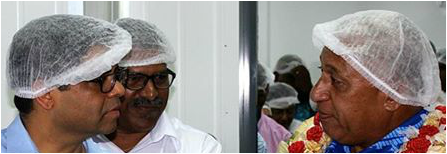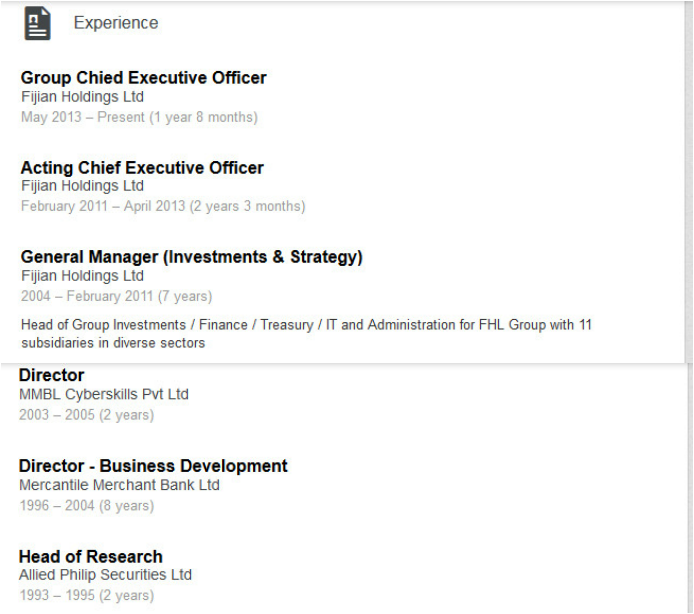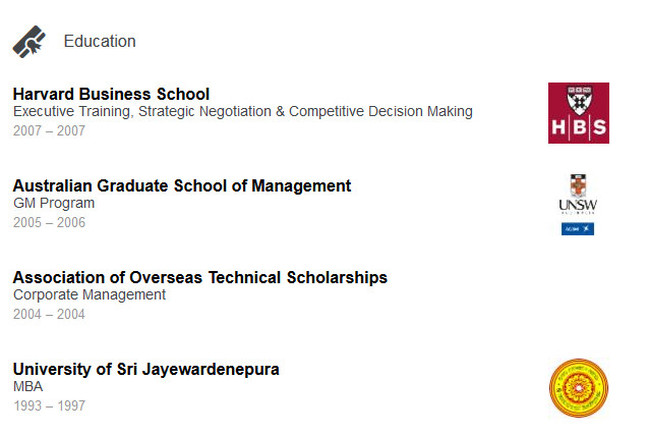 MELTDOWN: No decree could protect these two who thought they were Mr Teflons with the passing of their Television (Cross Carriage of Designated Events) Decree 2014
MELTDOWN: No decree could protect these two who thought they were Mr Teflons with the passing of their Television (Cross Carriage of Designated Events) Decree 2014 * Aiyaz Sayed-Khaiyum in his Ministerial statement to Parliament, December 9 2014 [Youtube clip] from 15:08: ‘The law that is in question sets out a number of designated events which requires all free to air television stations to televise these events.’ https://www.youtube.com/watch?feature=player_embedded&v=peQJK6Yif28
* Only four days and much public anger later - Frank Bainimarama’s speech at the opening of the Punjas Biscuit factory on December 13 2014: ‘As you will have all heard, we reached an agreement yesterday with World Rugby to end the impasse that deprived everyone of coverage of the first game in Dubai. The remaining games will all be seen on our two free-to-air TV stations.’
[Exactly when did Mai TV stop being one of Fiji’s free-to-air TV station, Mr Prime Minister?]
The sheer scale of the self-dealing nepotism and corruption at the heart of the Aiyaz Sayed-Khaiyum regime-within-a-regime, and his wicked attack on Fiji TV, Fiji TV’s shareholders and the wider rugby-supporting public, is laid clear by the silent removal of Mai TV from the compromise arrangements cobbled together to head off public revolt.
Mai TV is the second of Fiji’s three free-to-air broadcasters by date of launch, has been entirely privately funded, and unlike the vastly wasteful FDB-funded FBC TV. The great irony of this government media policy (which operates all of its bashing through the Orwellian-named Media Industry Development Authority) is that on a tiny, advertising-led budget Mai TV has unearthed and launched exceptional local TV talent like news broadcaster Stanley Simpson, chef Dominic Sansom [Mai Kana] and storyteller Manoa Rasigatale’s programme Manoa We Ni Yava.
However in the brother-help-brother world of the Sayed-Khaiyums that means nothing. This new deal now benefits only FBC TV. The station – headed by the Attorney-General’s brother - has picked up the remaining tournaments in the IRB 7s Series and the Rugby World Cup later in the year. For MAI TV, though, there is nothing.
This follows in line with similar brother-helps-brother wheezes
- The Television Amendment Decree 2012 put Fiji Television (principal competitor to FBC TV as a free to air station, and the country’s only pay TV operator) on a six-month long licensing leash. Fijileaks can’t think of any country in the world where the CEO of one broadcast station has his brother in charge of deciding whether the government extends or not the short-term licence of its main competitor.
- The Media Industry Development (Amendment) Decree 2013. In February 2013 Sayed-Khaiyum formally exempted his brother’s TV station from the harsh provisions of the so-called ‘Get Murdoch’ 2010 Media Decree, which set maximum foreign ownership at 10 percent of the company, with 90 percent of the company to be owned by Fiji citizens permanently residing in Fiji. Under the February 2013 exemption, government-owned FBC (and FBC alone) are allowed to partner up with a foreign company, with the foreign company having up to 85 percent of the entity (leaving FBC a minimum required stake of 15 percent and one seat on the board of the joint venture).
http://www.fiji.gov.fj/getattachment/912651ac-fd80-4d40-a1c4-75e8c10860e4/Decree-No-10---Media-Industry-Development-(Amendme.aspx
Just to recap!
In the dark days of the Dubai 7s blackout, rugby fans had been told in an increasingly shrill and desperate voice by the Attorney-General that this was about ‘all broadcasting entities’ having access to the events listed within his legally risible and much-hated Television (Cross-Carriage of Designated Events) Decree 2014.
The AG’s one-for-all, and all-for-one principle was why rugby fans were denied television coverage of the Dubai 7s, as the Attorney-General went to war with World Rugby Ltd.
In fact (as we were to discover in due course) ‘all’ broadcasters actually meant ‘one’ broadcaster – the government TV mouthpiece run by brother Riyaz – which is teetering under the burden of crippling interest payments.
As they starred at blank TV screens during the Dubai 7s, the Attorney-General did his best to convince a completely disbelieving Fiji public with a barrage of lies about audience share – provided at huge cost by the Qorvis in-house research team.
But those who understood the pure venality of Sayed-Khaiyum powerbase knew better.
· The first event captured under the Decree allowed FBC TV ceo Riyaz Sayed-Khaiyum to pick the pocket of MAI TV who were the exclusive licensee of the 2014 FIFA World Cup, the biggest TV sports property in the world by value.
· The Decree was rushed through (enacted May 29 2014) just a couple of weeks before the start of the FIFA World Cup (June 12)
· The consequence was, with no consultation with them as rightsholders, or FIFA, MAI TV were compelled by the government decree to share their exclusive rights with FBC TV (and Fiji TV)
· To complete the fiction that the decree was about treating all broadcasters equally, MAI TV had to be included as one of the free-to-air broadcasters that would also benefit by receiving shared rights for the key designated events from FBC TV and Fiji TV
· So MAI TV contributed their FIFA World Cup rights to this collective in the genuine expectation they would at least receive something in return – because the decree said so
· But under the embarrassing climbdown authored by the Attorney-General Mai TV’s reciprocal interest was quietly sacrificed in the interest of saving face, delivering live coverage of the 7s, as well as propping up the crumbling financial edifice that is FBC TV.
Tough lessons that we learnt from ‘7s-gate’:
1. If, at one stage, the Attorney-General appeared blessed with nine lives, his ham-fisted defence of the indefensible has seen him sacrifice most of those lives (perhaps all of them) as far as the wider electorate is concerned.
2. Don’t count on the Opposition to be able to tackle the government effectively. Never has the complete shamelessness of the Bainimarama regime been more exposed – and more obviously at odds with the interests of the citizenry. But Sodelpa did not marshal Parliamentary procedure, nor put together their facts or effectively use the privilege they were entitled to as MPs (which would have helped media like the Fiji Times), to draw out the overlapping and cynical roles of Qorvis and the Sayed-Khaiyum brothers.
3. As is now the government’s familiar course, stripping out i-Taukei participation in so many areas of public life, the fate of the i-Taukei and their access to their national sport was left entirely in the hands of a weird triangle of non i-Taukei rugby agnostics: two Fiji-Indian brothers deeply in each others pockets, and Nouzab Fareed, the Sri Lankan who heads Fijian Holdings, the 61-percent majority owner of Fiji TV. Fareed led his station’s desperate discussions with World Rugby in the hope of winning a roll-over of Fiji TV’s six-month licence. [‘We are trying to satisfy the government and we are hopeful that in December they will give us a licence.’ Fareed told the Fiji Times last month.]
Of longer term significance is the financial situation of FBC and FBC TV.
FBC TV was set up with the primary purpose of delivering a democratic mandate to the 2006 coup leader Frank Bainimarama by controlling and manipulating the voters’ understanding of the issues facing the country in the September elections.
That only a government TV station could deliver the election result needed (as opposed to the shackling of the Fiji Times, and the cheer-leading of the Fiji Sun) was born out by the Qorvis’ media survey: 64 percent got their news from the TV ‘most of the time’, more than newspapers and magazines combined.
So control over television and the creation of FBC TV gave Bainimarama and his regime supporters the best chance possible to set the agenda, harass the opposition, and avoid the legal sharpening of the knives that would follow if the staggering excesses of his military-backed government (spending on the armed forces alone, now at $200m per year) were ever examined by a genuine civilian government.
So FBC TV has fulfilled its first (short-term) function: the winning of the election. Now the question is how to pay for the thing over the long run.
In the last figures seen by FijiLeaks, the Fiji Development Bank had injected a staggering $22,696,465 into the creation of FBC TV.
Assuming a fairly standard commercial interest rate of 6.8 percent, FBC TV would be paying out $150,000 per month principal and interest. But Riyaz Sayed-Khaiyum has admitted in a published interview with a business magazine that the interest FBC is on the hook for is more like 12 percent. This means a monthly repayment of almost $300,000 a month, a staggering amount potentially, before any other expenditure is made.
Under government pressure FDB has been instructed to accept part of this $300k per month repayment in the form of contra-advertising through the FBC network. Which is bizarre because the FDB is strictly a business-to-business lender but now has one of the highest profiles of any of the banks in Fiji.
CAUGHT IN THE SHOOT OUT BETWEEN GOVERNMENT AND WORLD RUGBY: The Sri Lankan born FHL CEO Fareed who represented Fiji TV in the discussions for FBC to share rugby feed!

- Date:01 Nov 2013
- Type:Company Director Magazine
Nouzab Fareed discusses why he joined Company Directors’ Fiji Committee and what it plans to offer members.
Company Director (CD): What is your background?
Nouzab Fareed (NF): I dropped out of school and started as a computer instructor. My first professional examination was with the Australian Computer Society. This was followed by qualifications from the Chartered Institute of Management Accountants of UK, then a Master of Business Administration and a Master of Arts in International Economics.
I am now a Chartered Accountant (Fiji), Chartered Management Accountant (UK) and a Fellow of CPA (Australia). I am also a licenced investment adviser (Fiji) and certified fraud examiner (US).
The General Manager Program at the Australian Graduate School of Management (AGSM) at the University of New South Wales made it all happen for me.
Before joining the Fijian Holdings Group, where I am now group CEO, I was the director of business development at Mercantile Merchant Bank in Sri Lanka and a director of FedEx, Western Union and NIIT in Sri Lanka.
CD: What is the value of an Australian Institute of Company Directors’ membership to you?
NF: My relationship with Australia through the Australian Computer Society, CPA and AGSM made me think an involvement with Company Directors would be great.
Out of curiosity, I attended a Company Directors Course in Darwin in 2012 and that was a turning point. Immediately after the course, I made changes to my company, from the board meeting agenda to directors’ training.
To date, Fijian Holdings Group has at least 18 Company Directors members, which is almost one-third of all members in Fiji.
CD: Why did you decide to join the Australian Institute of Company Directors’ Fiji Committee?
NF: Fiji has gone through difficult times in terms of company directors and we have seen plenty of legal cases.
Joining the committee was an ideal opportunity to improve the quality of corporate governance in Fiji.
When the role was offered, I jumped at the opportunity and to date we have done well. It is a fantastic team. We are confident we will improve membership in Fiji two-fold within the next two years.
CD: What kind of support does the committee provide to local members?
NF: The committee is still in its early stages, but we are planning to host a few local workshops for small and medium-sized enterprises, as well as for provincial companies. This will happen in the coming year.
The committee aims to find ways to launch and deliver Company Directors’ education programs and to identify opportunities for new programs.
We are responsible for ensuring the professional development and networking activities for directors and senior business leaders to undertake.
CD: In addition to chairing the Fiji Committee, what other roles do you have?
NF: I am the group CEO for Fijian Holdings Group and a director of more than 20 companies, including Goodman Fielder Fiji, Marsh Fiji and Golden Manufacturing.
I have directorships in Fiji, Papua New Guinea, Solomon Islands and Samoa.
I am council member for Fiji Institute of Accountants, CPA Fiji Branch, Fiji-PNG Business Council and Suva Chamber of Council.
In addition, I sit on the University of South Pacific and MBA Advisory Board.
CD: What do you enjoy about being a director in Fiji? What are the challenges?
NF: It is a great experience as all companies are unique in some way. While it is a learning experience, it is also an opportunity to contribute. The challenge is to implement changes and adopt new thinking. But we have managed.
CD: Who inspires you?
NF: Business leaders from Mike Smith to Ann Sherry have inspired me. Of course, I am fan of Warren Buffet as well as Richard Branson.
CD: What are your passions outside of work?
NF: I love deep-sea scuba diving, international travel and being a member of Toastmasters, a group that focuses on improving one’s public-speaking skills. I am also an avid Freemason




